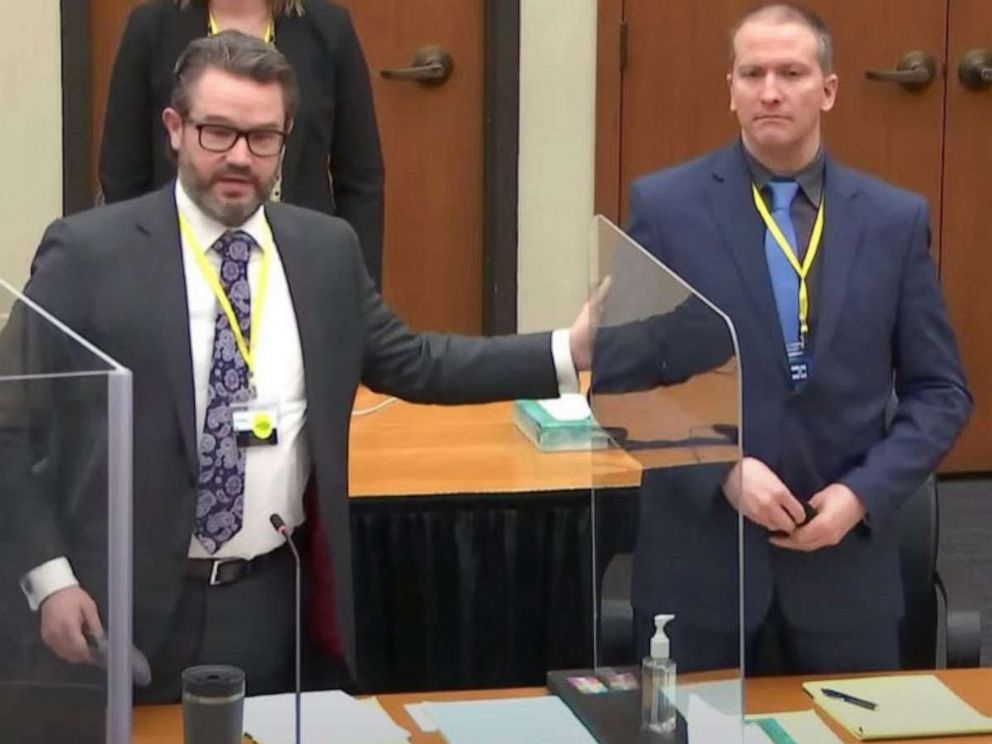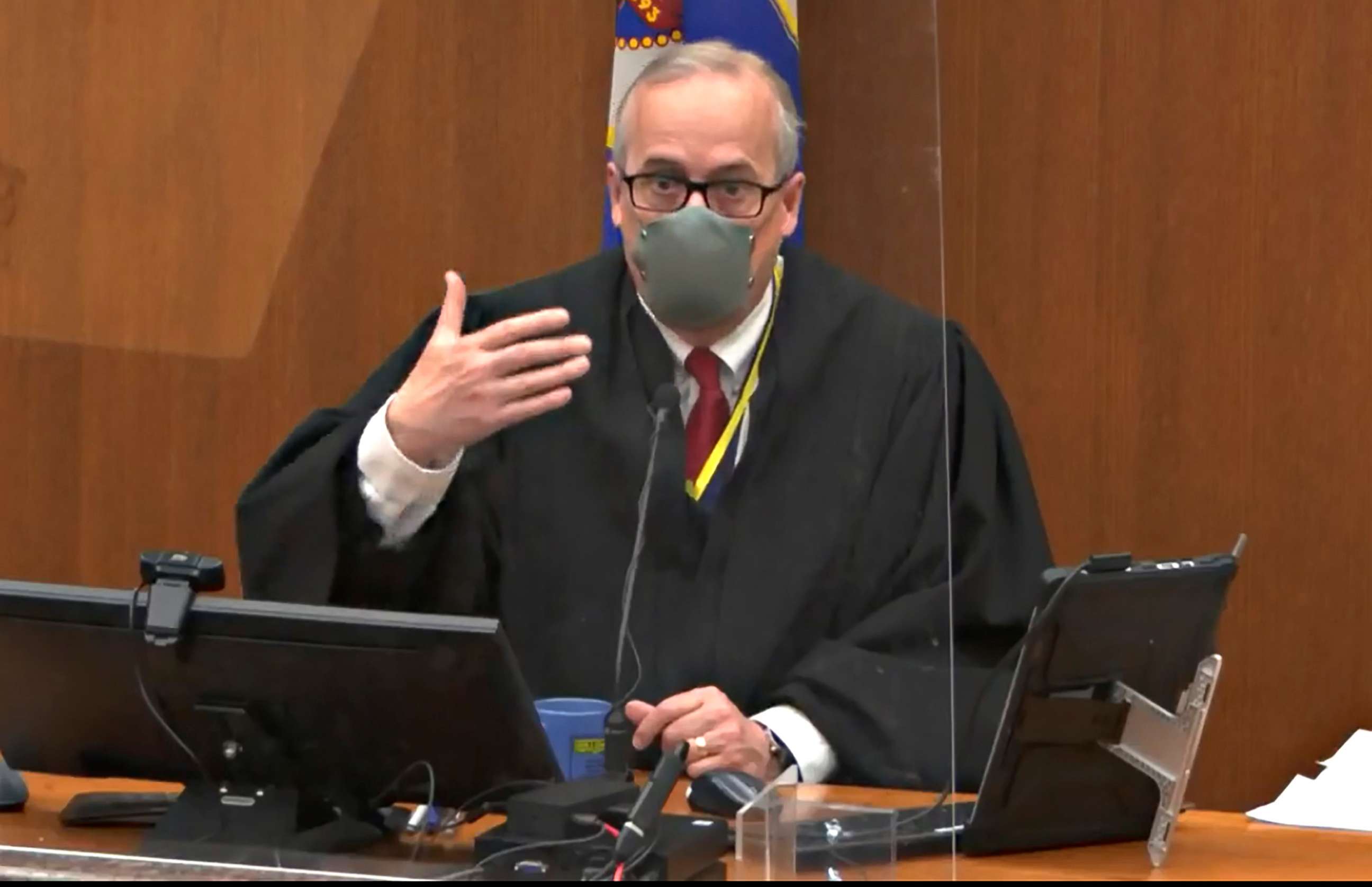Derek Chauvin trial setback: 2 jurors dismissed over knowledge of $27 million settlement to George Floyd family
The judge will consider a defense motion for continuance of trial on Friday.
The trial of former police officer Derek Chauvin was dealt a major setback on Wednesday when the judge in the case dismissed two jurors already selected for the panel after they said they heard about the $27 million settlement the city of Minneapolis reached with the family of George Floyd and conceded they can no longer be impartial.
Hennepin County District Court Judge Peter Cahill removed the two jurors from the panel following Zoom hearings held in court with the seven jurors picked to hear evidence in the trial before the settlement was announced.
Two other jurors said they had inadvertently heard of the settlement announced on Friday, but felt they could set aside what they heard or saw about the civil court action and maintain impartiality and decide the case based solely on the evidence presented during the trial.
But the two jurors Cahill excused from the panel said the dollar amount the city agreed to give the Floyd family confirmed the reservations they already had about Chauvin's culpability in the death of Floyd during a May 25, 2020 arrest, in which the former police officer was videotaped by a bystander kneeling on the back of the 46-year-old man's neck for more than nine minutes as he cried out "I can't breathe."

Asked by Cahill how knowledge of the settlement would affect his ability to be impartial in this case, one of the dismissed jurors, a Hispanic man, who had been referred to in court as Juror 36, said, "It will impact it a lot."
He reminded Cahill that he had been questioned extensively about "my strong opinions" against Chauvin.
"Clearly the city of Minneapolis has some strong opinions as well and this just kind of confirms the opinions that I already have," he said. "I think it will be hard to be impartial."
The second dismissed juror, a white man known as Juror 20, described the $27 million settlement as "kinda shocking."
"That kinda sent the message the city of Minneapolis felt something was wrong and they wanted to make it right to the tune of that dollar amount," he said before being removed from the case.
The impaneled jury briefly dropped to seven members from the nine that had been selected since jury selection began on March 9. On Wednesday afternoon, two new jurors were picked, bringing the total members of the panel back up to nine.
"We're back where we started this morning, which is better than being behind," Cahill said before court adjourned for the day.
The latest jurors selected are a Black married father in his 40s, who works in management and has lived in the Twin Cities area for about 20 years, and a multiracial mother in her 40s who works as an organizational management consultant. On Wednesday, court officials said the ninth juror seated was a white woman, but on Thursday morning issued a correction on how she says she identifies.
Meanwhile, two more jurors were seated Thursday afternoon, bringing the total number on the panel, so far, to 11.
One of the new jurors is a single nurse who lives in a suburb of Minneapolis and currently works with COVID-19 patients. She self-identified to the court as a white woman in her 50s. The other is a grandmother of two, who is retired from working in marketing at a financial institution five years ago, volunteers to help what she described as "underserved" children and has an undergraduate degree in childhood psychology.
Cahill and the lawyers in the case said they want to seat 14 jurors for the trial, including two alternates.

Chauvin is charged with second-degree unintentional murder and second-degree manslaughter. A third-degree murder charge was reinstated last week after the Minnesota State Court of Appeals ruled that Cahill had erred by dismissing the count in October.
Chauvin has pleaded not guilty to the charges.
Chauvin's attorney, Eric Nelson, asked Cahill on Monday to poll all the selected jurors to determine if news of the settlement influenced their ability to judge the case on the facts.
Nelson requested a continuance of the trial and for the court to consider again a change of venue based on what he described as "prejudicial pre-trial publicity."
Cahill said Wednesday that he will hold a hearing on Nelson's motions on Friday. He denied Nelson's motion to sequester the jury for the duration of the trial, which is expected to last at least four weeks.
Due to the setback in jury selection over the news of the settlement, Cahill announced he will be giving the defense three extra peremptory strikes to reject potential jurors without having to state a reason. He said the prosecution will be allowed one additional peremptory strike.
Nelson said on Monday that it was "perplexing to me" that the settlement announcement came right in the middle of jury selection.
"They had a press conference on Friday where the mayor of Minneapolis is on stage with the City Council and they're using, what I would say, very well-designed terminology. The 'unanimous decision of the City Council' for example. It just goes straight to the heart of the dangers of pre-trial publicity in this case," Nelson argued. "You have elected officials -- the governor, the mayor -- making incredibly prejudicial statements about my client."
Cahill responded that "the defense has a legitimate concern."
Cahill said the settlement announcement "has to be characterized as prejudicial pre-trial publicly."
Prosecutor Steve Schleicher of the Minnesota State Attorney General's Office assured Cahill that his team had nothing to do with the announcement.
"We can control the witnesses that we call, we can control the evidence that we bring in, we can control the motions, but we cannot and do not control the civil aspect of the case. We cannot and do not control the Minneapolis City Council and we certainly cannot and do not control the news cycle," Schleicher told Cahill on Monday.
Since the announcement of the settlement, several prospective jurors have been dismissed after informing the court they had heard of the settlement.
One would-be juror released from jury service this week -- a woman who works in human resources -- said during voir dire questioning, that while she understands a civil case decision is based on a preponderance of evidence, a verdict in a criminal case is decided beyond a reasonable doubt.
"Generally, the preponderance of the evidence in civil cases leans towards guilt," she told Cahill. "My guess is that with that large of a settlement that the city felt they would not prevail in civil court and therefore didn't feel that they could make a case to overcome the preponderance of the evidence."
Cahill began court on Wednesday by scolding media outlets, saying it had come to his attention that some news organizations had reported on documents, computer messages and Post-it notes seen on the courtroom tables for the prosecution and defense. He also admonished the media about reporting details of security arrangements on the 18th floor of the Hennepin County Government Center, where the trial is taking place.
"If that continues, the media is going to be excluded and we’re going to shut down the media center," said a visibly angry Cahill, who did not specify which media outlets were at fault.
"So, I hope everyone takes this to heart that I consider this security issue very seriously and reporting out to the public what our arrangements are is extremely irresponsible and it will be met with sanctions if it continues," Cahill said. "I would hope that any media that posted such things online will immediately take them down. Failure to do so will result in possibly you being kicked out of the media center as well."




